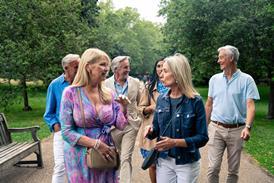
The ‘Remaking Beamish’ project has seen the opening of its first attraction as Joe the Quilter’s cottage is added to the reasons to visit at Beamish, The Living Museum of the North in County Durham.
The cottage, the first building in the museum’s £18 million project, is a recreation of the ‘lost’ home of renowned Georgian quilter Joseph Hedley, who was murdered in 1826.
What can visitors see at the cottage?
The cottage features stones from Joe’s original home, after the remains of the building in Warden, near Hexham, Northumberland, were uncovered during an archaeological dig by Beamish staff and community members. These will include the flagstones where Joe stood 200 years ago.
The exhibit will tell the story of quilting and the growth of cottage industries in the early 1800s.
A drawing on a postcard that was produced after Joe’s murder gave valuable details about how his home, which was later demolished in 1872, looked. A crack in the front wall of the original cottage, clearly visible in the 1820s drawing, has even been reproduced.
Beamish director, Richard Evans said: “After years of planning we have finally opened the first of many new exhibits that are part of Remaking Beamish.
“This beautifully-crafted, heather-thatched cottage gives us a rare chance to understand what everyday life was like in the North East during the early part of the 19th century.
What else can groups expect from a visit to Beamish?
The Remaking Beamish project is said to be the biggest development in the museum’s 48-year history and will also include a 1950s Town, 1950s Farm and Georgian coaching inn, where visitors can stay overnight. The project is expected to be complete in 2021.
Visitors to Beamish can take a tram ride through the town to experience the sights, sounds, smells and tastes of 1820s Pockerley, The 1900s Town, The 1900s Pit Village and The 1940s Farm.
Groups can receive free coach parking as well as free admission for coach drivers and GTOs for those with 15 or more people.
For more information, visit www.beamish.org.uk.












